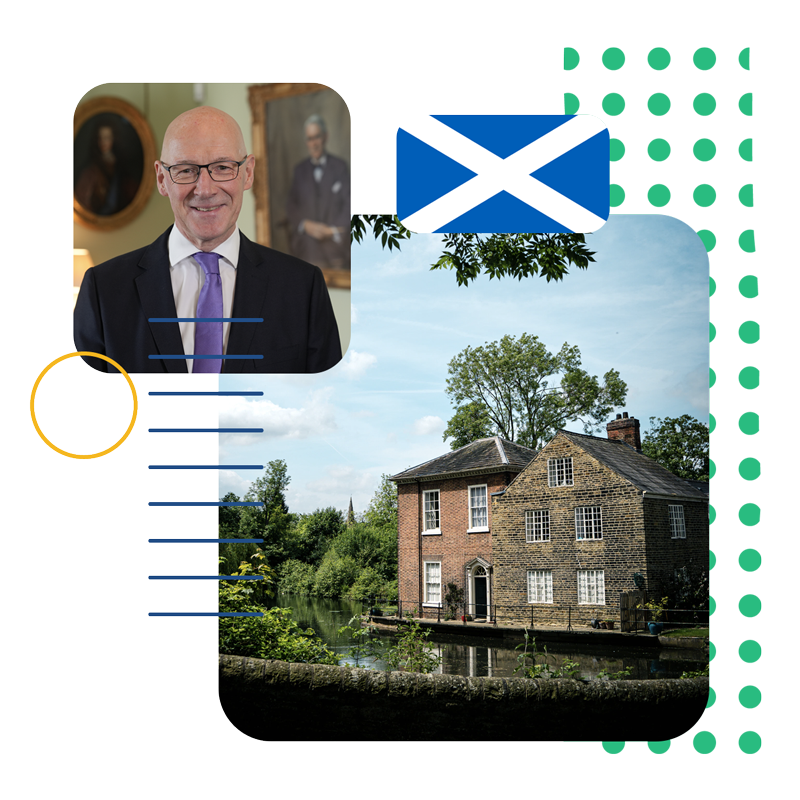Read on for more information regarding the laws and changes in compliance for the Scottish holiday let market.

Holiday Let Rules in Scotland
Scotland has the most defined legislation in the United Kingdom for governing short term rentals.
Scotland Holiday let Rules – Scotland’s short-term rental licensing scheme, introduced in 2022, mandates that all short-term rental properties, including those listed on platforms like Airbnb, must be licensed by local authorities. This initiative aims to ensure safety, address community concerns, and regulate the growing sector, which has significant impacts on housing availability and neighborhood dynamics. Property owners must meet specific criteria, including health and safety standards, and pay a licensing fee.
The scheme also includes provisions for neighbor consultation and caps on the number of nights a property can be rented.

Health & Safety
In Scotland, short-term rental properties must adhere to stringent health and safety regulations as part of the licensing scheme introduced in 2022. These regulations are designed to ensure the safety and well-being of guests and cover several key areas.
Property owners are required to conduct regular fire safety assessments, install smoke and carbon monoxide detectors, and ensure that all electrical and gas appliances are serviced and in good working order. Additionally, properties must be kept in a good state of repair, with secure locks on doors and windows, and adequate sanitation facilities. Compliance with these standards is mandatory for obtaining and maintaining a short-term rental license, reflecting Scotland’s commitment to providing safe and secure accommodation for visitors.
Current Fire Safety Legislation
The current legislation means that all short term let operators must get an annual Fire Risk Assessment for their property. This must be done by a qualified individual and it is essential that this is done each year.
Electrical Installation Condition Report (EICR)
An Electrical Installation Condition Report involves the inspection and testing of all the electrical installations in the property. This is to to determine whether the installation is safe for tenants (including short term rental guests) and building owners.
The report will include these three key elements:
- Integrity of all electrical installations within the holiday rental
- A Record of any and all damage to sockets, switches and other installations throughout the house
- Confirmation (or not) that the property complies with all relevant regulations and legislation.
Owners and property managers should refer to the Government Guide for landlords: electrical safety standards in the private rented sector
Portable Appliance Testing (PAT)
Portable Appliance Testing (PAT) involves the examination of portable electrical equipment and appliances, such as TVs, microwaves, and phone chargers. These appliances must pass regulatory tests to ensure they are safe for use in a “working environment,” as outlined by the Health and Safety at Work Act 1974 and the Regulatory Reform (Fire Safety) Order 2005.
PAT testing consists of three key elements:
- Checking all electrical equipment in the property.
- Conducting a formal visual inspection of the electrical equipment.
- Manually examining all equipment with a portable appliance tester device (the PAT test).
Regular visual inspections
Legionella Check
The Short Term Let Licence in Scotland is very clear: the Health and Safety Executive (HSE) requires a legionella risk assessment for every rental property. This assessment aims to detect and control any risk of water in the property becoming contaminated with legionella.
Property Overview: Document the property type, water systems, and identify tenants who may be vulnerable due to age, health, or lifestyle.
Water Temperatures: Ensure cold water remains below 20°C and hot water above 50°C at outlets, adjusting as necessary to meet these standards.
Storage Tanks: Tanks should have tight lids, clean water, and be maintained below 20°C. Adequate insulation is essential.
Boiler Settings: Set the boiler to maintain water at 60°C to prevent burns.
Regular Outlet Use: Flush outlets not in daily use weekly to prevent bacterial buildup.
Shower Maintenance: Clean, disinfect, and descale showers at least twice a year.
Pipework Inspection: Identify and rectify “dead legs” in the pipework where water could stagnate.
Inoccupancy Protocols: For properties left vacant for long periods, follow weekly outlet flushing or system draining.
Hot Tubs
Installing a hot tub in a holiday let typically increases visibility on OTA platforms and allows for higher nightly rental rates. However, owners must be aware of the legal requirements associated with operating a holiday rental with a hot tub. By installing and renting out a hot tub, you are obligated to fulfill your legal duties under the Health & Safety at Work Act 1974.
Compliance Checks
While there is abundant information online regarding hot tub maintenance, much of it pertains to personal usage, recommending checks 3-4 times a week. However, for short-term rental properties, you must follow the recommendations for commercial operators.
According to Health & Safety Guidance 282, operators should perform chemical tests at least twice a day. You can access the guidance via this link: Health & Safety Guidance 282
Hot Tub Checks
Chemical Levels
Check the balance of chlorine or bromine, the pH, alkalinity, and water hardness.
Monthly/Quarterly Biological Testing
Test for bacteria that can cause diseases, including Legionella.
Record Keeping
Operators are required to maintain records of these checks for several years to ensure compliance and safety.
Get started easily with a personalised product tour
Compliance doesn’t have to be boring! Book a no obligation demo with one of our sales team to discuss all things compliance…


